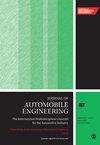重型车辆背压可控变速泵控制转向系统的节能与控制特性研究
IF 1.5
4区 工程技术
Q3 ENGINEERING, MECHANICAL
Proceedings of the Institution of Mechanical Engineers Part D-Journal of Automobile Engineering
Pub Date : 2024-07-26
DOI:10.1177/09544070241265161
引用次数: 0
摘要
面向智能化和绿色化发展的重型汽车转向系统需要满足高精度和节能的动态转向要求。传统的转向系统采用阀式伺服系统,转向精度高,但阀口能量消耗大。相比之下,变速泵控制系统(VSPCS)通过直接体积控制来实现转向系统的精确伺服,从根本上消除了阀口的能量耗散。然而,由于背压较低,VSPCS 缺乏足够的系统刚度,因此难以实现精确转向。针对这些局限性,本文提出了一种背压可控变速泵控制转向系统方案(BCVSPCSS),该方案将 VSPCS 的节能流量供应与用于背压控制的伺服比例阀相结合,从而改善了系统的动态性能。这种集成可在保持能源效率的同时实现精确转向;角度和背压双目标非线性控制策略的设计对于处理系统中的不确定性和非线性至关重要。Lyapunov 分析表明,闭环系统具有渐近稳定性。本文建立了 BCVSPCSS 实验台进行实验验证。结果表明,背压控制能有效提高系统的抗干扰能力。在相同的工作条件下,两个系统的最大角度误差基本相同,都在 1° 左右,而 BCVSPCSS 的能耗比阀控转向系统降低了约 84.6%。本文章由计算机程序翻译,如有差异,请以英文原文为准。
Research on energy saving and control characteristics of back pressure controllable variable speed pump controlled steering system for heavy vehicles
Steering system of heavy vehicle facing intelligent and green development needs to satisfy the requirements of high precision and energy-efficient dynamic steering. Traditional steering systems use valved servo systems, which offer high steering accuracy but result in significant energy dissipation at the valve ports. In contrast, the variable speed pump control system (VSPCS) realizes the precise servo of steering system through direct volume control, which basically eliminates the energy dissipation at the valve port. However, the VSPCS lacks sufficient system stiffness due to low back pressure, making it difficult to achieve precise steering. To address these limitations, this paper proposes a back pressure controllable variable speed pump controlled steering system scheme (BCVSPCSS), which combines the energy-efficient flow supply of the VSPCS with a servo-proportional valve is used for back pressure control to, improving the dynamic performance of the system. This integration allows for precise steering while maintaining energy efficiency; The design of a dual objective nonlinear control strategy for angle and back pressure is crucial to deal with uncertainty and nonlinearity in the system. The Lyapunov analysis shows that the closed-loop system has asymptotic stability. In this paper, the experimental bench of BCVSPCSS is built for experimental verification. The results show that back pressure control effectively enhances the system’s immunity. Under the same working conditions, the maximum angle error of the two systems is roughly the same, both around 1°, while the energy consumption of BCVSPCSS is reduced by about 84.6% compared to the valve controlled steering system.
求助全文
通过发布文献求助,成功后即可免费获取论文全文。
去求助
来源期刊

CiteScore
4.40
自引率
17.60%
发文量
263
审稿时长
3.5 months
期刊介绍:
The Journal of Automobile Engineering is an established, high quality multi-disciplinary journal which publishes the very best peer-reviewed science and engineering in the field.
 求助内容:
求助内容: 应助结果提醒方式:
应助结果提醒方式:


